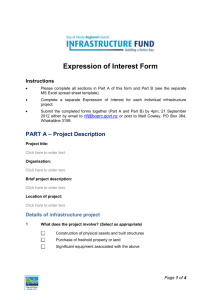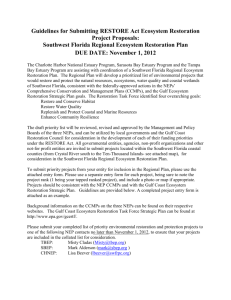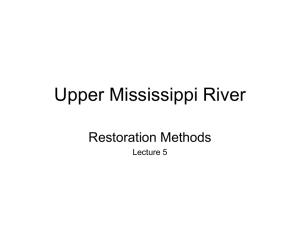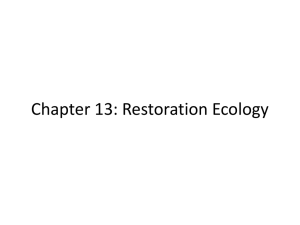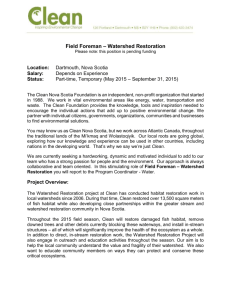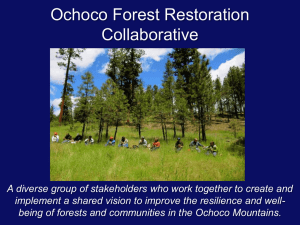PosDesc Restoration Ecologist Field
advertisement
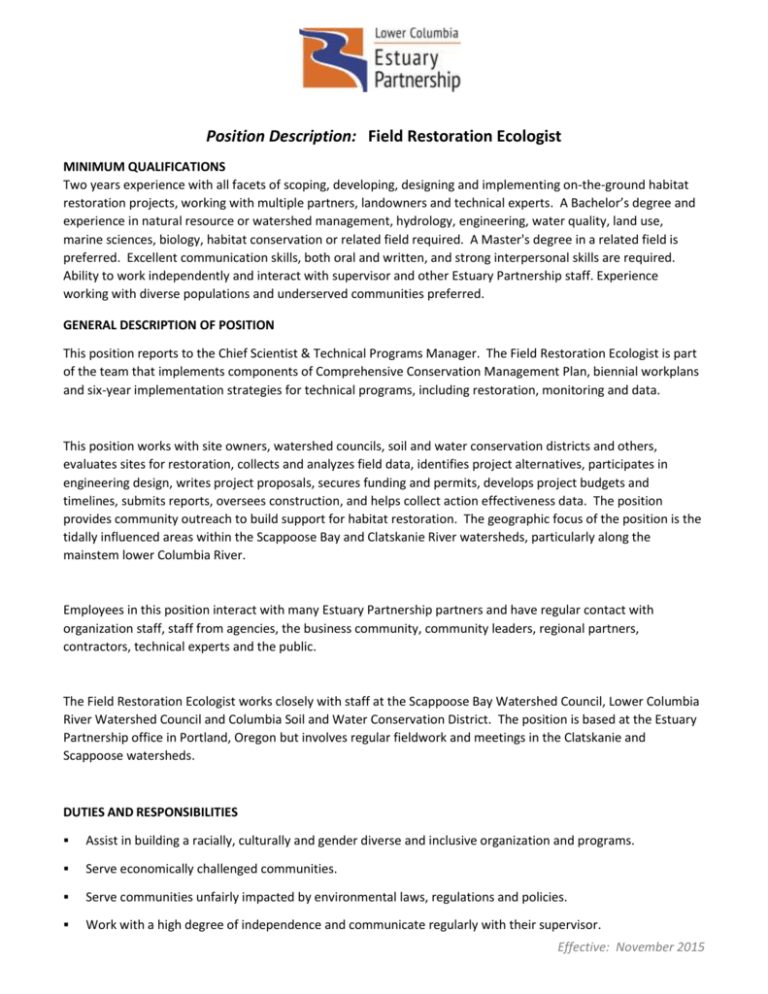
Position Description: Field Restoration Ecologist MINIMUM QUALIFICATIONS Two years experience with all facets of scoping, developing, designing and implementing on-the-ground habitat restoration projects, working with multiple partners, landowners and technical experts. A Bachelor’s degree and experience in natural resource or watershed management, hydrology, engineering, water quality, land use, marine sciences, biology, habitat conservation or related field required. A Master's degree in a related field is preferred. Excellent communication skills, both oral and written, and strong interpersonal skills are required. Ability to work independently and interact with supervisor and other Estuary Partnership staff. Experience working with diverse populations and underserved communities preferred. GENERAL DESCRIPTION OF POSITION This position reports to the Chief Scientist & Technical Programs Manager. The Field Restoration Ecologist is part of the team that implements components of Comprehensive Conservation Management Plan, biennial workplans and six-year implementation strategies for technical programs, including restoration, monitoring and data. This position works with site owners, watershed councils, soil and water conservation districts and others, evaluates sites for restoration, collects and analyzes field data, identifies project alternatives, participates in engineering design, writes project proposals, secures funding and permits, develops project budgets and timelines, submits reports, oversees construction, and helps collect action effectiveness data. The position provides community outreach to build support for habitat restoration. The geographic focus of the position is the tidally influenced areas within the Scappoose Bay and Clatskanie River watersheds, particularly along the mainstem lower Columbia River. Employees in this position interact with many Estuary Partnership partners and have regular contact with organization staff, staff from agencies, the business community, community leaders, regional partners, contractors, technical experts and the public. The Field Restoration Ecologist works closely with staff at the Scappoose Bay Watershed Council, Lower Columbia River Watershed Council and Columbia Soil and Water Conservation District. The position is based at the Estuary Partnership office in Portland, Oregon but involves regular fieldwork and meetings in the Clatskanie and Scappoose watersheds. DUTIES AND RESPONSIBILITIES Assist in building a racially, culturally and gender diverse and inclusive organization and programs. Serve economically challenged communities. Serve communities unfairly impacted by environmental laws, regulations and policies. Work with a high degree of independence and communicate regularly with their supervisor. Effective: November 2015 Participate in appropriate work groups, including the Science Work Group. Represent the Estuary Partnership at meetings on matters related to the Estuary Partnership technical program. Participate in regional meetings and conferences. Build relationships with the USACE, BPA, NOAA, state government agencies, local governments, diking districts, watershed councils, consultants, contractors, restoration practitioners, landowners, and others involved in the lower Columbia River to enhance regional collaboration and advance regional habitat protection. Assist in collecting and analyzing data and applying analytical approaches to evaluate restoration potential and site-specific restoration alternatives. Assist Scappoose Bay and Lower Columbia River Watershed Councils with building landowner and community support for watershed restoration and habitat restoration projects. Coordinate with partners and Estuary Partnership science team to identify potential projects, secure baseline data, develop project goals, develop restoration alternatives, select a preferred alternative, develop project scope, timeline and budget, secure necessary project permitting, identify and assist with post project monitoring and effectiveness monitoring data. Identify grant and other funding opportunities, provide information to supervisors and complete application elements as requested. Develop and manage contracts, including scopes of work, bid packages, and request for proposals, and oversee project and contract implementation. Ensure compliance with the contract terms, organization policies and procedures, applicable laws and rules, permit requirements and specified monitoring protocols. Write project reports, provide project updates, disseminate program/project information, make presentations on project or program information. Participate in team meetings to discuss and advance program objectives and enhance collaboration. Regular travel throughout the lower Columbia River area; occasional after hours and weekend work. POSITION SPECIFIC KNOWLEDGE AND SKILLS Knowledge of laws, procedures, regulations, and permitting requirements associated with restoration projects and monitoring programs in Oregon and Washington. Knowledge and familiarity with federal and state salmon recovery plans, processes and actions. Knowledge of current theory, practices, principles and technological developments of ecosystem management, habitat restoration, biology, water quality and ecosystem monitoring. Knowledge of habitat forming processes and restoration approaches that can be employed to restore sustainable habitat forming processes and conditions, particularly for threatened and endangered fish. Knowledge and skills with all aspects of habitat restoration implementation from the initial concept to post project monitoring, including estimating project costs. Ability to analyze complex information and data and familiarity with GIS and database tools. Ability to work with community goals and landowner needs and engage with partners. Effective: November 2015 KNOWLEDGE AND SKILLS Skill working in a team environment with understanding of roles and responsibilities of members. Understanding of the purpose, mission and activities of all program areas of the Estuary Partnership. Knowledge about Columbia Basin or Lower Columbia River and the National Estuary Program. Ability to develop, plan, and manage multiple projects and tasks simultaneously in various stages of project development or implementation and maintain schedules associated with them. Skill providing adequate communication with members of the team, the public, and supervisors, including emerging issues and concerns with individual projects. Strong verbal communications skills, ability to write clearly and persuasively, and build consensus. Demonstrated ability to think strategically with high degree of initiative. Ability to represent the organization on advisory or technical committees and at meetings or conferences. Skill working with a variety of viewpoints and diverse interests, including diverse populations and underserved communities. Strong interpersonal skills. STANDARDS OF PERFORMANCE Support and carry out the Estuary Partnership ethics; place the river and public trust at the forefront. Adapt and continually improve. Exhibit positive attitude and high level of professionalism. Provide exceptional service internally and externally. Committed to including diverse populations and underserved communities, economically challenged communities and communities unfairly impacted by environmental laws, regulations and policies. Effective: November 2015
